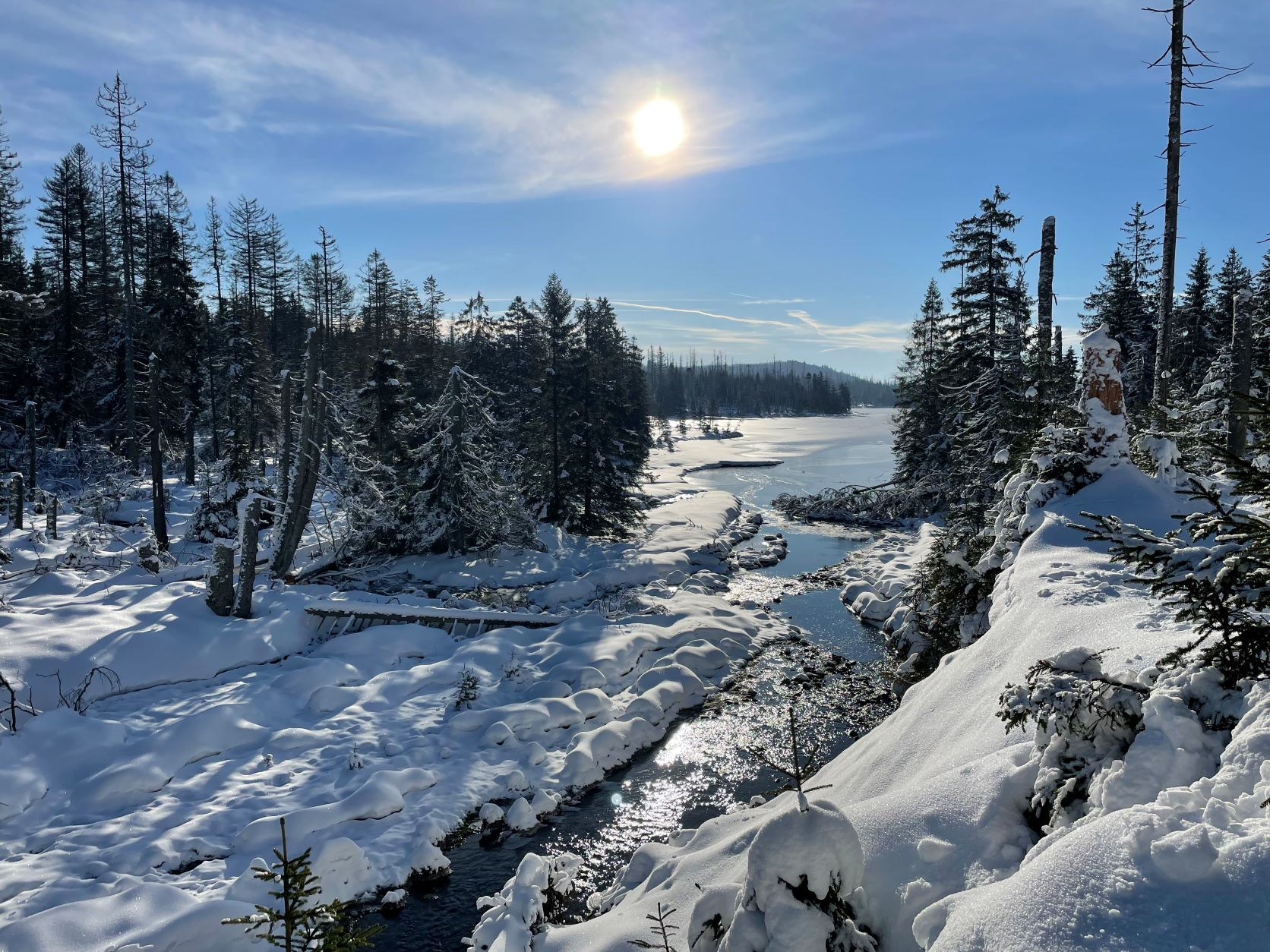>German version below<
It’s kind of crazy that you want to investigate the oceans and have to go to the mountains first. Huh, why is that? I haven’t quite understood it yet myself , but that is what I did.
Due to the Corona pandemic, it is unfortunately no longer so easy to explore the ocean with a research ship. You have to be very careful that you don’t get infected with the virus beforehand or that you don’t bring it on board. In my case I have been working for almost 4 years on the preparation of the expedition MSM106, which is not only a research expedition but also a so-called “Floating University”. First of all, write the application, get feedback, revise the application, get a grant, then hope for a good period in the ships’ schedule, then prepare the expedition concretely, put together the team… and then the pandemic! Trip cancelled, new trip planned, new period and ship assigned, prepared… and then virus variant! Great, trip canceled again, new allocation of ship time received… and then vaccinations received and thus the hope to finally be able to do the trip that was planned a long time ago.
During this expedition we not only want to pursue our scientific questions and research projects in the region, but also offer 12 West African students of the WASCAL program funded by the German Federal Ministry of Education and Research (BMBF) the opportunity to learn and apply methods of marine research in an authentic environment. Of course, there are many things that can be learned and practiced in a laboratory on land. But working scientifically on board of a research vessel on the high seas requires not only technical-methodological knowledge, but also the ability to work together in a team under extremely challenging conditions with the highest possible efficiency. This is something you can only learn under real conditions and this is exactly what we want to enable the students to do during our expedition. If you want to study the oceans and understand them better, you also have to go out to sea to conduct your measurements and collect your samples.
So now it was apparent that on our third attempt we would finally be able to do our expedition, hallelujah… and then… Omicron came! My first reaction was honestly an inward smile. Fortunately, the expedition was not canceled. Thanks to complete vaccination protection, it is still possible to carry out such an expedition. BUT, the new virus variant can sneak on board quite easily and if you get infected just before the trip, you can’t participate anymore.
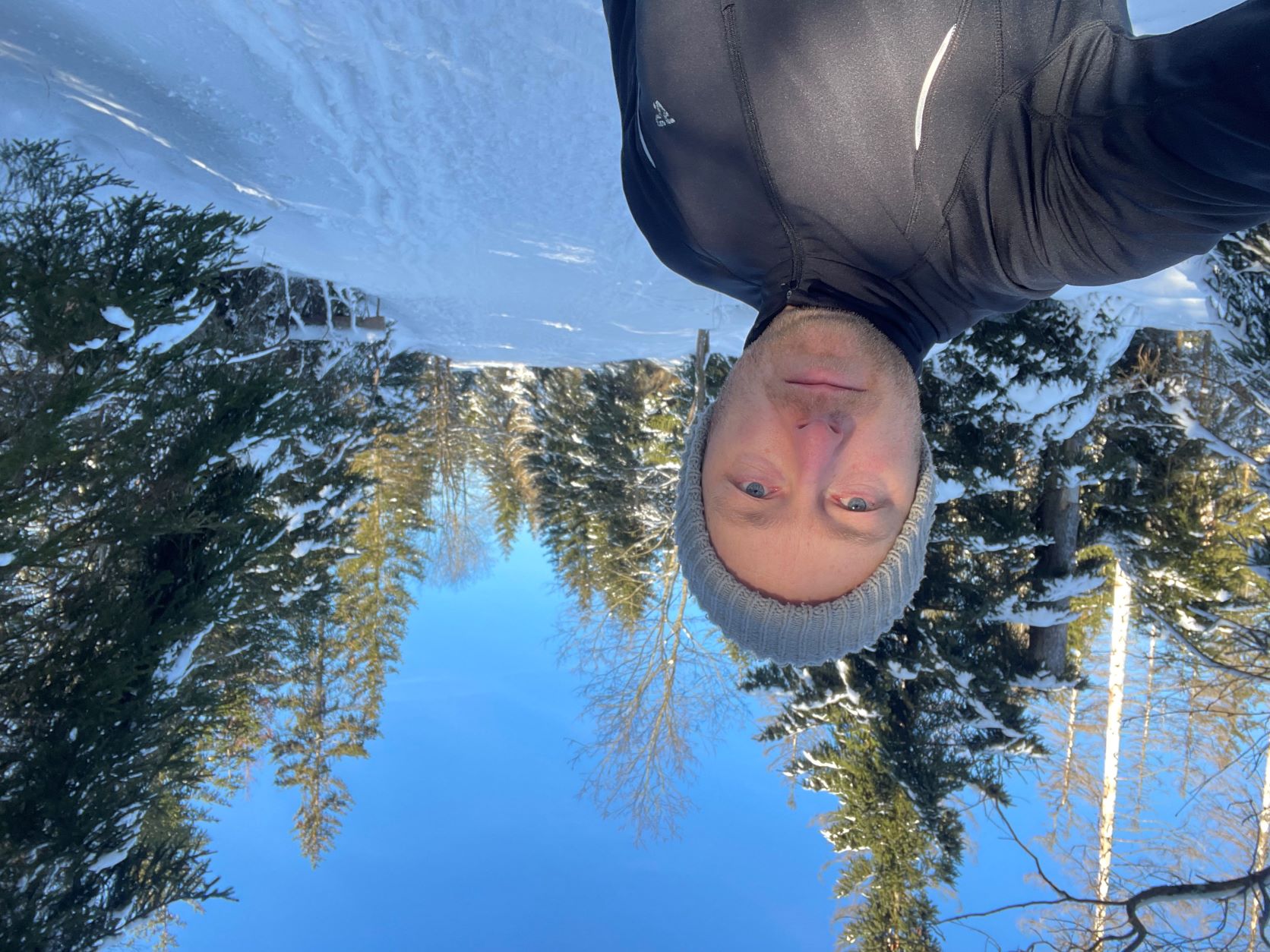
Therefore, I had decided with a heavy heart to separate from my family already 10 days before departure. I didn’t want to get infected in advance, especially since I’m also leading the expedition and I didn’t want to jeopardize the third attempt. Thanks to the great support at home, I went to the empty house of my parents in the mountains for 10 days, 10 days of permanent home office to coordinate the last things for the expedition. As a reward, there was even snow in the mountains. Finally, it was time to take the plane to Mindelo on Cabo Verde, together with the other researchers from Germany, who are all working hard to take over the training of the students in addition to the research program on board.
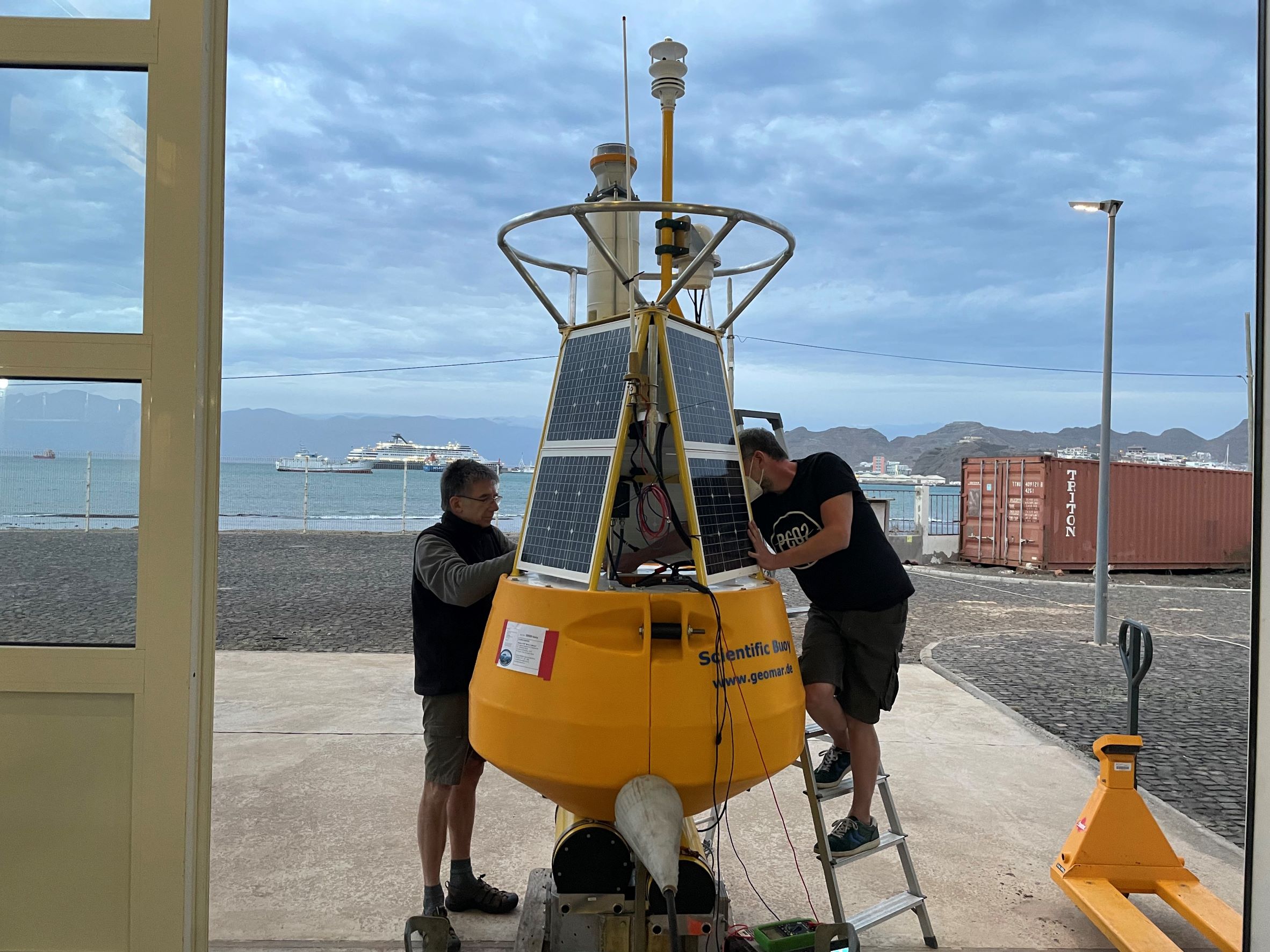
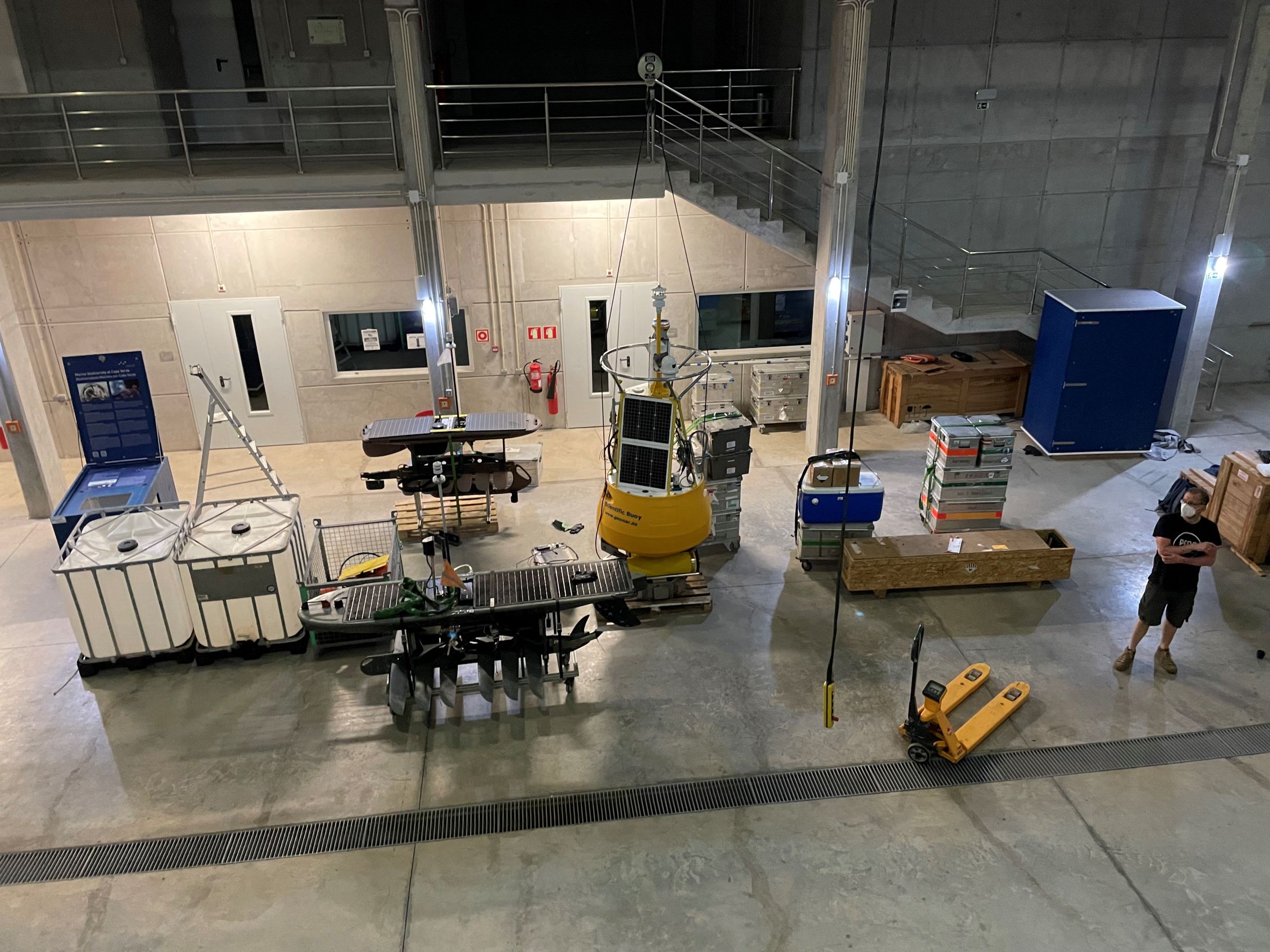
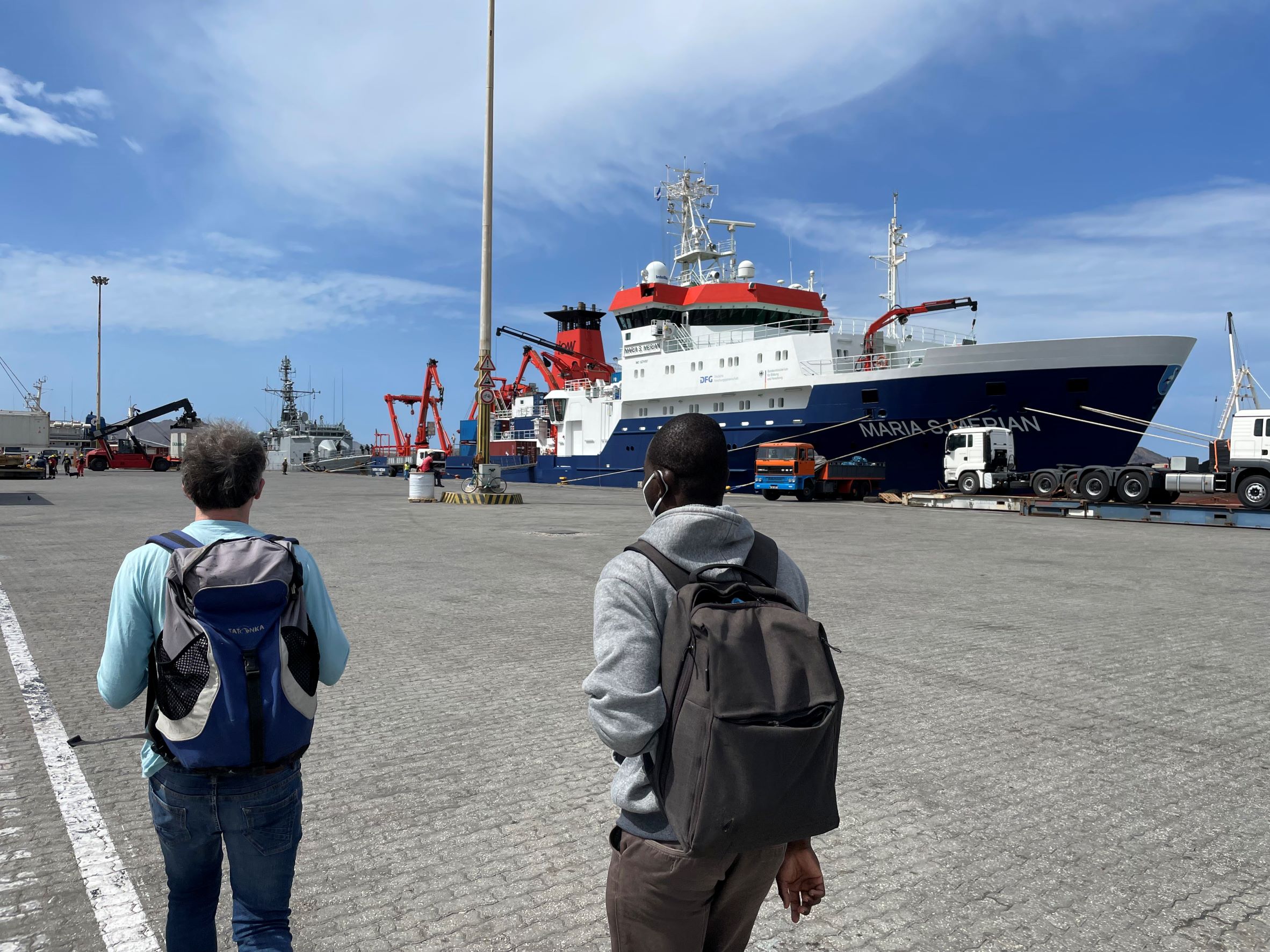
After arriving in Mindelo, we used the time until the arrival of the Maria S. Merian to conduct a 2-day seminar with the students in preparation for the cruise, of course online, because… never mind.
But now the time has finally come, tomorrow we will finally, finally, finally all meet on board the Maria S. Merian for the first time to unload the expedition equipment from the shipped containers on deck together and to set up the equipment.
Anticipation is high on both sides, with a total of 13 nations represented on board. In addition to scientific knowledge and experience, we will certainly have a lot of cultural exchange and learn a lot about each other.
I think there will be a lot to talk about. We will write about some of it in this blog…
Björn Fiedler
Vom Weißen ins Blaue…
Irgendwie schon verrückt, da möchte man die Meere erforschen und muss zunächst dafür in die Berge. Hä, warum denn das? So ganz verstanden habe ich das auch noch nicht, habe es aber einfach gemacht.
Aufgrund der Corona-Pandemie ist es leider nicht mehr so einfach, mit einem Forschungsschiff die Meere zu untersuchen. Man muss vorher sehr aufpassen, dass man sich vorab nicht mit dem Virus infiziert oder dieses sorgar mit an Bord einschleppt. In meinem Fall habe ich seit nunmehr fast 4 Jahren an der Vorbereitung der Expedition MSM106 gearbeitet, welche nicht nur eine Forschungsexpedition sondern auch eine sogenannte „Floating University“ ist. Erst einmal den Antrag schreiben, Rückmeldung bekommen, Antrag überarbeiten, ein Bewilligung bekommen, dann auf einen guten Zeitraum im Fahrplan der Schiffe hoffen, anschließend die Expedition konkret vorbereiten, das Team zusammenstellen… und dann die Pandemie! Fahrt abgesagt, neue Fahrt geplant, neuen Zeitraum und Schiff zugewiesen bekommen, vorbereitet… und dann Virusvariante! Toll, Fahrt erneut abgesagt, neuen Fahrtzeitraum bekommen… und dann Impfungen erhalten und somit die Hoffnung, nun doch die vor langer Zeit geplante Ausfahrt endlich durchführen zu können.
Bei dieser Expedition wollen wir nicht nur unseren wissenschaftlichen Fragen und Forschungsvorhaben in der Region nachgehen, sondern auch 12 westafrikanischen Student*innen des vom Bundesminsterium für Bildung und Forschung (BMBF) finanzierten WASCAL Programms die Möglichkeit bieten, Methoden der Meeresforschung in einer authentischen Umgebung zu erlernen und selber anzuwenden. Im Labor an Land kann man natürlich auch vieles erlernen und praktizieren. Aber mit einem Forschungsschiff auf hoher See wissenschaftlich zu arbeiten, erfordert nicht nur technisch-methodische Kenntnisse, sondern auch die Fähigkeit in einem Team unter äußerst herausfordernden Bedingungen mit höchstmöglicher Effizienz zusammenzuarbeiten. So etwas kann man nur unter realen Bedingungen erlernen und genau dies wollen wir den Student*innen während unserer Expedition ermöglichen. Wenn man die Ozeane untersuchen und besser verstehen möchte, dann muss man auch auf das Meer hinaus, um dort seine Messungen durchzuführen und seine Proben zu sammeln.
Nun hat sich also abgezeichnet, dass wir beim dritten Anlauf unsere Expedition endlich würden durchführen können, Halleluja… und dann… kam Omicron! Meine erste Reaktion war ehrlich gesagt ein innerliches Schmunzeln. Abgesagt wurde die Expedition zum Glück nicht, dank vollständigem Impfschutz kann man dennoch eine solche Expedition durchführen. ABER, die neue Virusvariante kann sich recht leicht an Bord schleichen und wenn man sich kurz vor der Ausfahrt infiziert, kann man nicht mehr teilnehmen.
Daher hatte ich mich schweren Herzens entschlossen, schon 10 Tage vor Abflug von meiner Familie abzusondern. Ich wollte mich auf keinen Fall vorab infizieren, zumal ich die Expedition auch leite und ich den nunmehr dritten Anlauf auf keinen Fall gefährden wollte. Dank der tollen Rückendeckung daheim ging es dann also für 10 Tage ab in die Berge ins leere Haus meiner Eltern, 10 Tage Dauer-Homeoffice um auch noch die letzten Sachen für die Expedition zu koordinieren. Zur Belohnung gab es dann sogar noch Schnee in den Bergen und dann ging es ab in den Flieger nach Mindelo auf den Kapverden, zusammen mit den anderen Forschenden aus Deutschland, die sich allesamt ins Zeug legen, um neben dem Forschungsprogramm an Bord auch noch die Ausbildung der Student*innen zu übernehmen.
In Mindelo angekommen haben wir die Zeit bis zum Einlaufen der Maria S. Merian genutzt, um schon ein 2-tägiges Seminar mit den Student*innen als Vorbereitung auf die Ausfahrt durchzuführen, natürlich online, weil… ach egal.
Aber nun ist es endlich soweit, morgen treffen wir uns endlich, endlich, endlich alle an Bord der Maria S. Merian zum ersten Mal, um gemeinsam die Expeditionsausrüstung aus den versendeten Containern an Deck zu entladen und das Equipment aufzubauen.
Die Vorfreude ist auf beiden Seiten groß, es sind insgesamt 13 Nationen an Bord vertreten. Neben den wissenschaftlichen Erkenntnissen und Erfahrungen werden wir sicherlich auch sehr viel kulturellen Austausch haben und gegenseitig viel übereinander erfahren.
Ich denke, dass es da einiges zu erzählen geben wird. Einiges davon werden wir in diesen Blog schreiben…
Björn Fiedler
